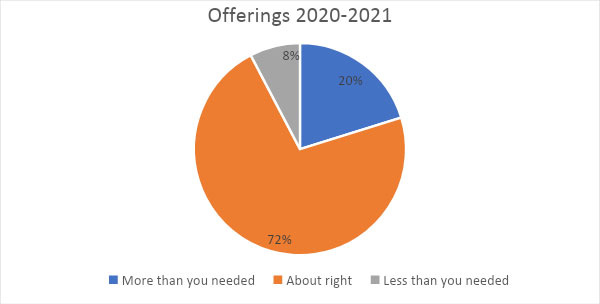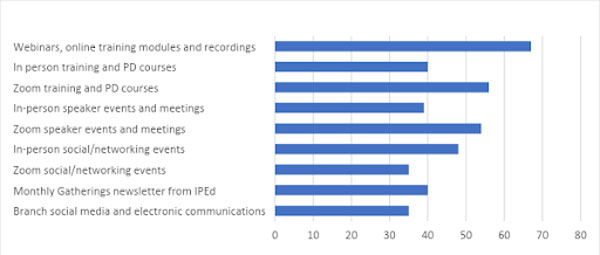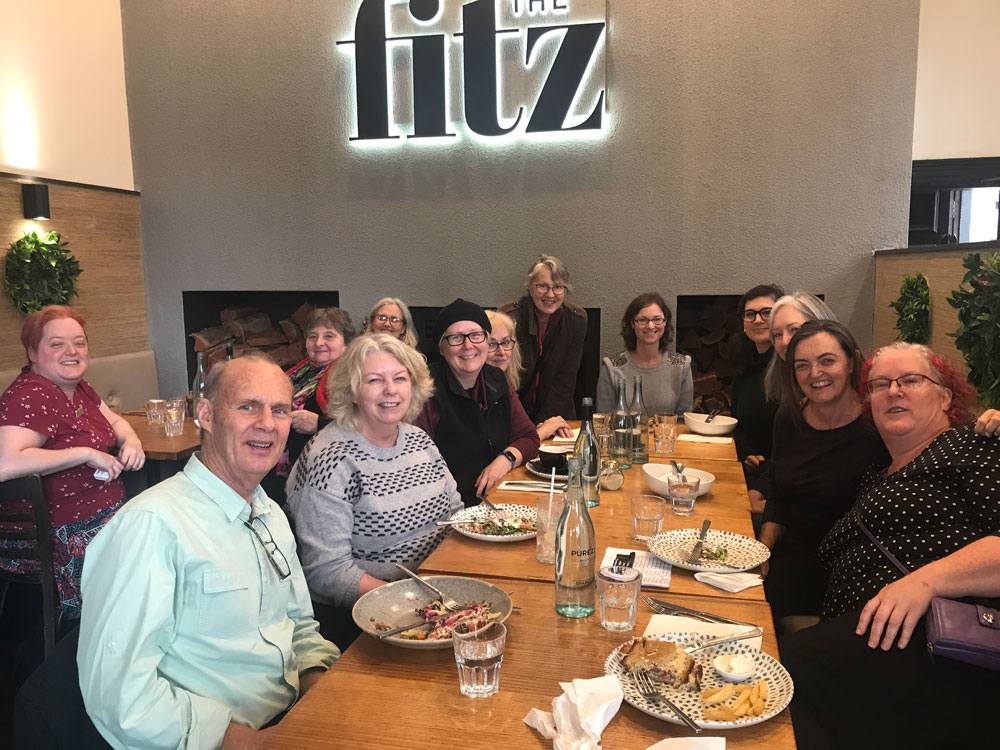President redefines words; redraws categories
by Stephanie Holt AE
How can it be June already? It feels like we’ve just embarked on a new year, just started regrowing our socialising wings, and suddenly there are real events, real meetings, real writers festivals. Or should that be ‘real’? If nothing else, this past year is redefining words and redrawing categories. I hope by the time this newsletter reaches you, you’ve weathered the latest COVID outbreak, and without undue harm.
For a gentle easing in, the Bendigo Writers Festival was a highlight for me. This lovely regional festival was a treat, bumping into a few edibuddies, picking up a few more books for the to-read pile and listening to some stimulating writer talk. All while stifling the urge to ask (or, when it’s a mixed live and online event — text) the kind of questions only an editor would think up.
A few weeks ago our committee met face to face for the first time for a productive planning and review session. In fact, some of us couldn’t resist adding a café lunch and an after-meeting drink to the afternoon. It was a treat to gather and chat, unencumbered by screen glitches, mute buttons and intrusive notifications.
The main discussion point was you, our members, and the results of our membership survey. You’ll see info about that elsewhere in Gatherings, and we’ll continue to draw on it to inform our planning.
The conference is a major focus this month, so there’s no speaker meeting from the branch. Instead, we can take advantage of the terrific program put together by EdTas. The branch subsidy scheme has helped 23 Victorian members with the cost of conference participation. Keep an eye out for details from EdVic for an invitation to a pre-conference social evening.
The branch committee is currently reviewing expressions of interest for our next Student Adviser. We’ve also created a new role to advise on accessibility, and are delighted that current Student Adviser Cassandra Wright-Dole has agreed to fill that role. Members may have met Cassandra through our earlier student Zoom cuppa, or you can catch her presenting on linguicism (also known as linguistic discrimination) and editing at the conference.
Have a good June, and see you at the conference.
Stephanie Holt AE
edvic.president@iped-editors.org
145 and counting … Some findings from our member survey
by Stephanie Holt AE
Wordcloud: your main personal challenges

We definitely understand survey fatigue. So, with some nervousness, we launched the EdVic branch member survey in April. Many members were also doing the general IPEd survey, and most of us are pestered regularly for feedback on everything from going to the footy to posting a parcel. Nevertheless, within three weeks almost a third of branch members — 145 — had answered our questions. So thank you. You’ve given us a great insight into how you’re travelling, where you’re heading, and what we can do to help you.
We can also announce that Jeanette Birtles has won our survey prize. Congratulations to Jeanette, who was delighted to receive a $50 Readings voucher.
Some members used their comments to pass on thanks for EdVic’s work to the committee. We really appreciated that. Others put a hand up to volunteer with the committee or specific branch activities. That enthusiasm and willingness was impressive. If you haven’t heard back yet, you will soon.
What follows is a brief summary of some key points from the survey. While these are necessarily generalised, many other ideas, suggestions and feedback were offered. The committee and subcommittees are considering those closely as they make plans and choose topics for coming activities. We are also sharing key findings with colleagues in IPEd and other branches.
A snapshot of the branch:
- You’re a committed lot. Almost a third of respondents (32 per cent) had been members for 11 years or more — but there’s plenty of new blood (17 per cent had been members for less than two years). This is a very close match to the membership as a whole.
- You’re spread across Victoria and beyond. While predominantly Melbourne-based (72 per cent), we had a significant number of respondents (22 per cent) in regional towns and cities and we even had responses from members in Thailand, Portugal and New Zealand. Again, this closely matches the overall membership.
- Our Professional Members were especially keen to share their thoughts. They made up 68 per cent of survey respondents, while being 57 per cent of our branch membership.
- You’re at all career stages. Half of you described yourselves as an established generalist editor (51 per cent) and almost a quarter (22 per cent) as an established specialist editor, but others are students, newer to editing, or do incidental editing as part of other roles and activities.
- Two-thirds of members surveyed (65 per cent) edit as their main professional role.
- Three-quarters of members working as editors were solely freelance (75 per cent), with others in-house (10 per cent) or a mix of the two (12 per cent).
The challenges editors identified didn’t surprise us. Recurrent ones included:
- getting paid appropriately
- facing unrealistic deadlines, budgets and expectations
- staying on top of industry trends and new technologies
- managing career pathways, not only on entering the profession but moving within it and transitioning to retirement
- finding work-life balance, with particular attention to mental health and manageable workflow
- having your work and the value of editing acknowledged
- finding work and clients, especially good and regular ones.
While COVID was only mentioned occasionally, there was certainly an impact with shrinking budgets for publishing and loss of opportunities. This was particularly pronounced for editing in specific sectors, with universities and the arts noted.
The new Style manual remains a challenge, with several mentions.
What do you want from EdVic and IPEd?
When asked what you want from your membership, the top five selections (of 11 options) were:
- accessing professional resources
- maintaining skills and current industry knowledge
- hearing about industry news and developments
- networking with professional peers
- formal training — new areas of practice (emerging technologies etc).
Overall, members expressed satisfaction with IPEd’s offerings last year. Increased online options last year were noted by many, even while some acknowledged screen overload, and bemoaned the loss of face-to-face training and networking opportunities.

Member needs and preferences
When asked about preferred ways to meet your needs, more respondents selected Zoom rather than in-person options for training and speakers, though demand for both types of delivery was strong. For networking and socialising, in-person was preferred, but again, there was demand for both approaches.
Preferred ways to meet your needs (% of respondents)

The largest single category selected was ‘webinars, online training modules and recordings’. While acknowledging some uncertainty around those definitions, it suggests on-demand resources are valuable. Some members specifically noted this in their comments.
When asked about in-person speaker meetings, the location and the topic/speaker were the most significant factors for members. Several models for in-person speaker events were proposed. Of these, the highest-ranking was for a speaker only, but with the option for attendees to purchase their own food and drinks, while the second-ranking was for a speaker only.
Remaining activities for 2021
For the remainder of the year, we will reintroduce more in-person activities. Some of these have started already, with a sold-out editors lunch. We’ll also change the way we run in-person speaker events, to reflect your preferences.
What you can look forward to:
- Zoom cuppas — these will continue, generally once a month. They’re a great way to get involved in discussion and networking with like-minded editors. You might even want to co-host a session.
- Social lunches — these are resuming, at both metro and (where hosts are available) regional locations. If you’re in a regional area and keen to host one, let us know.
- Social after-work drinks — these will be reintroduced, with frequency depending on demand.
- Speaker meetings — these will continue once a month, but will include a couple of in-person speaker meetings, and more Zoom meetings.
- PD workshops — these will continue about once a month, and you can expect one or two to be run as in-person training courses.
- Annual Branch Meeting — this will be by Zoom for 2021. Expect more details soon.
- Branch Christmas party — we hope to hold an in-person event this year.
From the EdVic survey: frequently asked questions*
by Jane Fitzpatrick
edvic.vicepres@iped-editors.org
When we got your responses to the survey, we could see that some topics could do with further explanation.
When we’re all vaccinated and allowed to meet in numbers, what’s going to happen to the Zoom events?
Don’t worry, they are not going to stop. In the next year, we’re looking at a mix of face-to-face and online events. We get it that online events suit many people, including editors living outside Melbourne.
Now that EdVic is a branch of IPEd, why is so much still run at branch level?
Good question. It takes us straight into the intricacies of how IPEd works, so bear with us. The transnational organisation is mainly focused on the big stuff: policy, advocacy, strategy and supporting the branches. It runs standing committees and working groups, made up of volunteers, who focus on particular areas such as accreditation, communication and pay rates. There is a full list of the standing committees and working parties in the member area of the IPEd website.
The branch committees comprise volunteers who focus on member services such as social media communications, training, social events and speaker meetings. Inevitably some services overlap with what IPEd central does, but most of the people who power activities for members are branch committee members. So EdVic will keep producing a lot of member services, even though, when provided online, those activities can now be accessed by members from any branch, wherever they might be.
Why didn’t you mention the conference and the accreditation exam in the survey?
Though we know the conference and accreditation are important, the survey was about our regular branch activity. Every IPEd conference has its own dedicated group of volunteers who put in hours of work behind the scenes to mount these magnificent events. EdTas is the official host branch of this year’s conference (though note that it is actually online).
Ditto accreditation — the Accreditation Board members are the folk to talk to; see the Accreditation page on the IPEd website. At branch level we have an Accreditation Board rep who keeps us in touch, and we support accreditation by running training courses that can help candidates prepare.
I get a LOT of IPEd emails offering activities — speakers, workshops, webinars, Zoom cuppas — what’s the difference?
Another excellent question. Zoom has made so many things available online, and in new forms, that it’s definitely harder to see what’s what when you’re navigating through the email blizzard.
EdVic uses these terms: (Note, all prices are valid at the time of writing.)
- Webinars are recorded deliveries on professional development topics, produced by IPEd (not the branch). They are not interactive. As a member you can purchase these at any time ($35).
- Speaker meetings (sometimes called speaker events) are branch presentations, often run online in the evening, which can range widely in topic and approach. They can range from having loads of information, seminar-style, through to being more at the casual, entertaining end of the range, and they usually have some Q&A. Zoom speaker meetings cost members $10. (Online speaker meetings may be recorded and made available for purchase for a limited time.)
- Professional development (PD) workshops are interactive training sessions for members (and, sometimes, non-members) to develop their editing, technical and business skills. They are delivered by professional trainers commissioned by the branch PD subcommittee. Workshops often run for two or more hours, and may be split over more than one session. They can cost members anywhere upwards of about $100 for a 2.5 hour session. These are not recorded.
- Zoom cuppas are one-hour online networking meetings where you can chat with other editors and share tips. They are free and are not recorded. They are usually based on a theme and capped at about 20 participants.
Of course, there are other activities, too, such as lunches and other kinds of networking events.
I miss the old newsletter — what can I do?
Well, if you’ve found this article, you’ve found the answer. The old newsletter still exists, in a way — it’s the ‘EdVic’ section under Branch news, where you can get just the Victorian items. But don’t overlook the other gems to be discovered in the shared section at the start of the newsletter — some written by Vic members — and in the other branches’ sections as well.
How do you decide what training to offer?
We aim for training that is relevant to editing theory and practice, directly or indirectly, that covers a range of topics, and develops the skills and knowledge required by professional editors. Within that broad context, we like to ask people what they want (including through this survey); to aim for a mixture of courses covering core editing, technical and business skills and genre editing; and to cater to a range of experience levels.
If you have a training need that is not being met, let us know about it (and if you know of a good trainer for it, even better).
How do you work out the prices for training and other activities?
We set prices based on the costs of delivering activities, with some contingencies built in. Our activities usually run at a slight surplus.
Every year we plan a budget and our performance against this is monitored by our branch Budget Officer, Marnie Hannagan, and ultimately overseen by IPEd’s Finance Officer, Erin Rundle.
I feel like there is more EdVic could do for me. What can I do about it?
(Definitely made this question up.) You’re in luck — there’s an opportunity to join the branch committee coming up in July. Why not nominate, share your ideas on what we should be doing — and help to deliver them?
I can’t join the committee right now but I still want to give feedback on some of the things you run.
That’s okay. We know many of you are too busy to volunteer. As a member, you are always welcome to send us your feedback. You can find contact details for the branch committee on the Contacts page on the IPEd website. We’re always looking for feedback. We can’t get enough of it.
* This heading is not at all true. These questions are works of fiction and any resemblance to actual member survey responses is purely coincidental.
New members
EdVic is pleased to welcome members who have joined or upgraded over the past month.
Professional members: Karyn Noble and Fleur Taylor.
Associate members: Nicholas Cahir; Josephine Daly; Alexander Francis Lotito; Angie Martin and Donald Ritchie.
Student members: Caroline Arnoul; Hanna Begic and Timothy Loveday.
We look forward to seeing you at our workshops and events and encourage you to make the most of IPEd’s networks for news and support.
New member profile: Angie Martin
Q: How long have you been an editor, and how did your career begin?
A: I established Versed Writings in 2016 but it wasn’t until March this year (when I left my salaried position at a university) that I started pursuing my freelance editing seriously. I decided to take the plunge because writing and editing is what I love doing most and, financially speaking, I’d built up sufficient savings working in government and the tertiary education sector to afford the start-up costs associated with launching my own business.
I studied public health and anthropology at university, and subsequently most of my professional career has involved policy and project work, but in 2019 I was awarded the First Nations HarperCollins Commercial Fiction Writing Award for my debut novel Melaleuca. So since then, I’ve been slowly gravitating back towards a career that is primarily focused on writing and editing.
Q: What type of editing makes up most of your work?
A: Most of my clients are PhD-qualified academics seeking copyediting work on their journal articles before formal submission. I also have a growing client base of budding fiction writers who want their manuscripts edited. I hope over time to expand into the government and corporate sectors, given my experience writing reconciliation action-plans and other Indigenous-oriented work.
Q: What aspect of the profession do you find most challenging?
A: It might sound silly, but so far, I find checking references and bibliographies the most challenging aspect of being an editor. Many academics submit to a wide variety of journals so often they’re not sure which style guide to follow (whether it be Harvard, Chicago or Cambridge, for example).
Q: How would you like to build your skills as an editor?
A: I’m currently undertaking ‘Launch your Editing Career’ with Capstone Editing and I love it.
I am also looking forward to finding a mentor who is more experienced in the field. I find the technical aspects of editing quite straightforward, but I would like some support in managing client expectations and how to answer frequently asked questions about editing.
Q: What are you looking forward to about being a member?
A: I’m hoping to attend some online webinars and L&D events and I’m looking forward to the networking and peer support that comes from membership.

Angie Martin
Report: April speaker meeting
The cookbook author’s companion: editing food books, with Katie Purvis
by Marie Pietersz
edvic.events@iped-editors.org
On 22 April, 50 members attended the EdVic speaker meeting to hear Katie Purvis tell them about her ‘lucky’ foray into cookbook editing and offer some key takeaways for editors who want to break into this specialised field, and some reminders for those editors who have already.
Read the full report here [PDF 91KB].
Report on workshop: Using PDF mark-up effectively
by Jane Fitzpatrick
edvic.vicepres@iped-editors.org
It has become increasingly common for editors and proofreaders to be supplied with page proofs in PDF format, rather than hard copy. Therefore, mastering the range of tools available and understanding how to mark up electronic proofs efficiently and clearly are becoming necessary skills.
In late April and early May, Kevin O’Brien ran two iterations of his training course on using Adobe Acrobat to mark up PDF pages. The course highlighted what PDF mark-up can do, showing editors how to adapt their approach to get the most from the software.
Kevin introduced the range of mark-up tools available in the Comments toolbar. Tips on how to accurately select text to be changed were invaluable. He toured the Properties toolbar, showing how colour can be used if it is necessary to classify corrections. He demonstrated many of the keyboard shortcuts that can be used to improve mark-up efficiency. He also explored the potential uses of single-page and double-page view (ideal for checking layout), and showed how view settings and measurement tools could be useful for checking the design aspects of pages.
Kevin emphasised that the aim is not to make your PDF proofs look like a traditional hard-copy proof, but to use the tools available to achieve clarity, ensuring you minimise the number of comments used to mark corrections. Other tips included making sure that small corrections are clearly visible — the highlighter is his tool of choice for many situations.
Workshop participants had the chance to evaluate sample mark-ups and contribute ideas on how to improve them. Each main training session was followed up by a one-hour Q&A the following Thursday evening.
Feedback from participants included: ‘Excellent insights and tips for a professional approach to PDF editing’.
Report: April freelance lunch
by Susan Pierotti
edvic.freelanceaffairs@iped-editors.org
Fourteen editors joyfully converged upon the Fitz Café in April for our first face-to-face freelance lunch since January 2020, finally having the courage to emerge from our self-isolated desks. Most of us were long-time editors with some newcomers to IPEd.
The food was excellent, the coffee plentiful and the chatter lively. Conversation ranged across work and personal topics, including how our workflows changed (or didn’t) during the 2020 COVID lockdown, the upcoming IPEd Conference, looking after elderly parents and even some romantic online encounters. All agreed that Zoom is great, but face to face is better.
Due to the onset of Victoria’s winter weather, and the fact that the usual cold and flu season may be spiced with another COVID outbreak, the next face-to-face freelance lunch will probably occur in spring. Watch this space.

